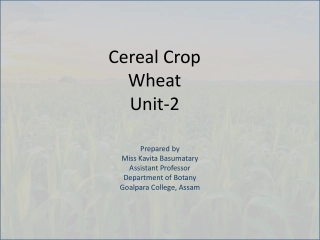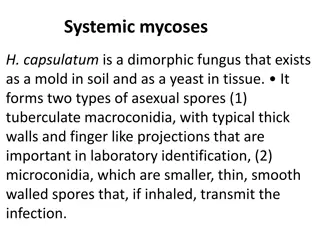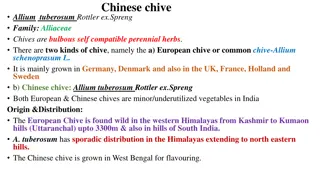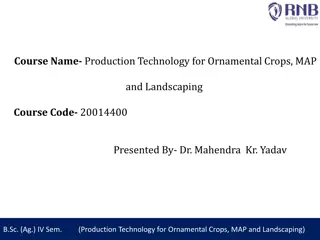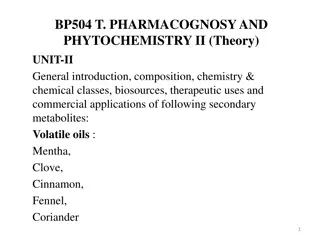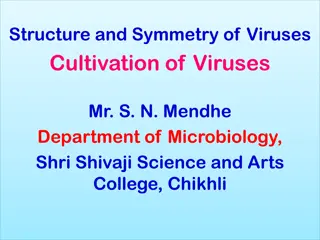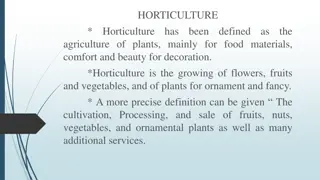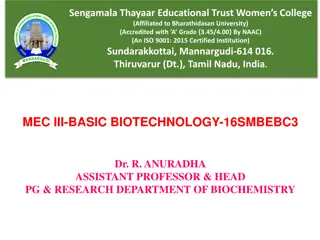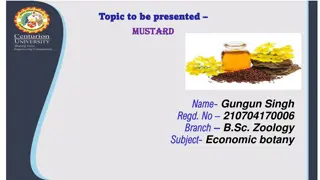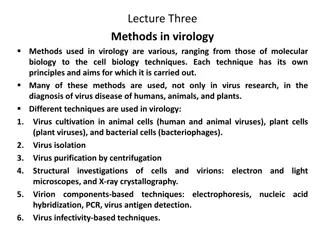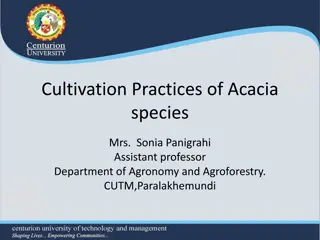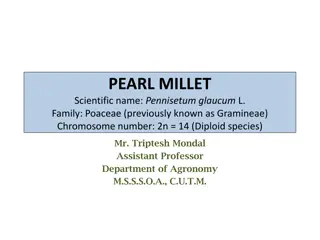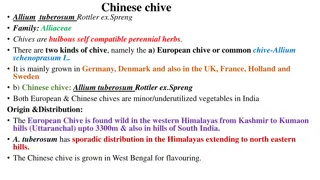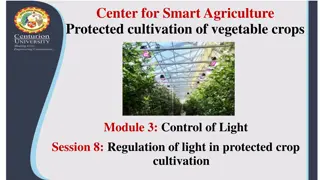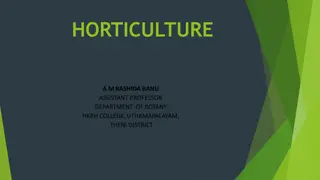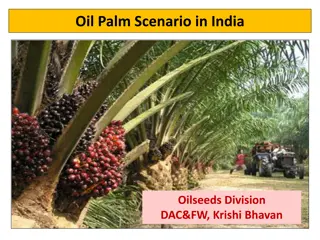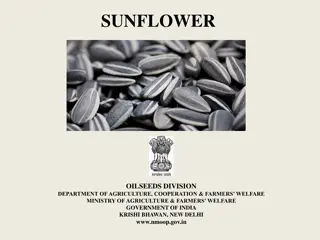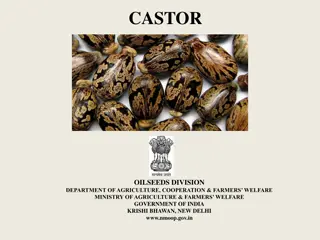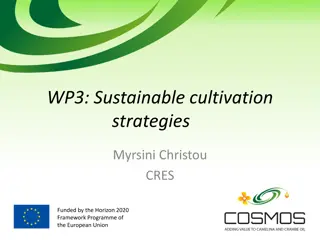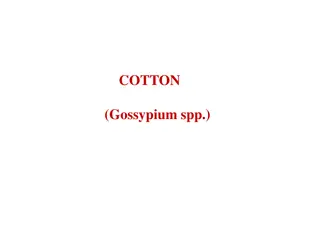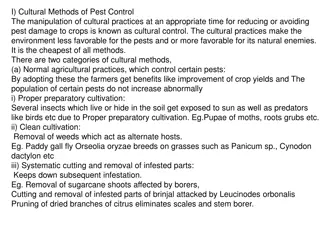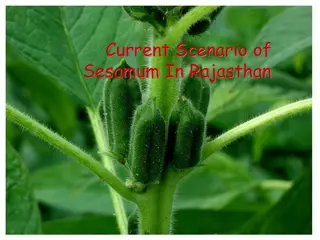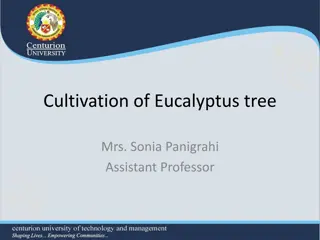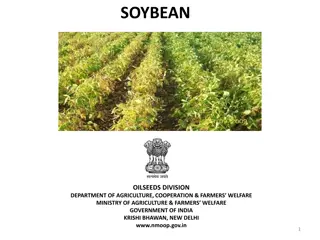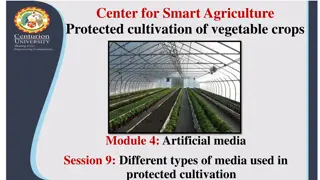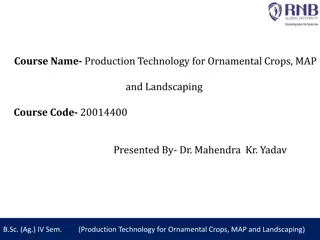cannabis cultivation business plan
Your cannabis cultivation business plan is your knowledgeable ally in the marijuana realm. It expertly guides you through market trends, daily operations, compliance, and finances, ensuring success in the dynamic cannabis industry.
6 views • 51 slides
Understanding Wheat: Origin, Cultivation, and Botanical Description
Cereals, particularly wheat, hold significant historical importance in human civilization. Originating around 8000 BC, wheat cultivation evolved over time, with different varieties like hexaploid, diploid, and tetraploid emerging. The botanical description of wheat highlights its annual nature, line
0 views • 25 slides
PRODUCTION TECHNOLOGY OF BROADBEAN
Broad beans, scientifically known as Vicia faba L., are a valuable crop with significant nutritional value. This article covers the botanical description, nutritive value, cultivation practices, climatic requirements, and more for broad beans. Learn about the plant's growth habits, preferred soil co
2 views • 23 slides
Challenges in the Rice Value Chain in Guinea
Guinea faces various challenges in its rice value chain despite being a significant producer. The country's production has increased, but it still struggles to meet domestic demand, leading to substantial rice imports. Rice cultivation is vital for Guinea's socio-economic development, with over 80%
6 views • 19 slides
Exploring the Health Benefits, Cultivation, and Varieties of Jamun Fruit
Jamun, also known as black plum, is a fruit with various health benefits such as improving haemoglobin levels, aiding in digestion, and managing diabetes. It thrives in tropical climates and a variety of soils. The fruit comes in different varieties like Ram Jamun and is propagated through both seed
6 views • 17 slides
Steps to Create Indoor Weed Home Grow Under $500
For many cannabis enthusiasts, the idea of growing their own plants at home is appealing, but the perceived cost can be a deterrent. However, with careful planning and budget-conscious choices, setting up an indoor cannabis homegrown can be achieved for under $500. In this comprehensive guide, weu20
8 views • 1 slides
Systemic mycoses
Systemic mycoses are fungal infections caused by dimorphic fungi such as Histoplasma capsulatum, Blastomyces dermatitidis, and Cryptococcus neoformans. Histoplasmosis is transmitted through inhalation of spores from soil or bat-infested caves, presenting with tuberculate macroconidia and microconidi
4 views • 9 slides
Comprehensive Guide to Chinese Chive Cultivation and Uses
Chinese chive, a bulbous perennial herb, is cultivated in various regions including India. It is rich in nutrients, vitamins, and minerals, with mild garlic-like flavor useful in salads, garnishes, and traditional medicines. This guide covers its botany, cultivation practices, uses, and soil/climati
1 views • 7 slides
Production Technology for Ornamental Crops and Landscaping: Ashwagandha Cultivation and Benefits
This course covers the production technology for ornamental crops, medicinal and aromatic plants, and landscaping practices. It emphasizes identifying different types of crops, landscaping principles, and the importance of processing and value addition in ornamental crops. Specifically, it explores
0 views • 11 slides
Cultivation and Production of Cinnamon Oil from Cinnamomum zeylanicum
Cinnamon oil, derived from the dried inner bark of Cinnamomum zeylanicum trees, has various uses and applications. This article discusses the cultivation and production process of cinnamon oil, including propagation methods, harvesting techniques, and drying processes to obtain the final product. Wi
1 views • 22 slides
Understanding the Structure and Symmetry of Viruses along with Cultivation Methods
Viruses, defined as obligate intracellular parasitic organisms, exhibit general properties such as small size, filterability, simple structure, and absence of cellular components. They vary widely in size and lack independent metabolism. The cultivation of viruses plays a crucial role in studying th
3 views • 37 slides
Understanding Horticulture: Cultivation for Food, Beauty, and More
Horticulture involves the cultivation of plants for food, beauty, and various purposes such as decoration and landscape design. It includes the growth of flowers, fruits, vegetables, and ornamental plants, as well as services like plant conservation and landscape restoration. Unlike agriculture, hor
0 views • 10 slides
Tea Cultivation in India: A Comprehensive Overview
Tea cultivation in India has a rich history dating back to 1823 when British settlers discovered wild tea plants in Assam. Today, India is the second-largest tea producer globally. Major tea-producing regions include Assam, West Bengal, Tamil Nadu, and Kerala. The ideal conditions for tea growth inc
0 views • 11 slides
Understanding Blue-Green Algae: Cultivation, Nutrient Composition, and Properties
Blue-green algae, also known as cyanobacteria, are photosynthetic bacteria that thrive in warm, nutrient-rich water bodies. They are packed with essential nutrients like vitamins, minerals, and amino acids, making them a valuable resource for overall health. Learn about the cultivation, uses, and hi
1 views • 21 slides
Insights into Sugarcane Cultivation in India
Sugarcane, a vital crop in India, serves as a source of sugar, gur, and khandsari. Its growth conditions, including climate, soil requirements, and labor intensity, significantly impact its cultivation. With India being one of the world's largest sugarcane producers, the crop plays a crucial role in
2 views • 16 slides
Harnessing Bamboo for Sustainable Agriculture in Somalia
The Horn of Africa Peace Network (HAPEN) is piloting bamboo cultivation in Kismayo and Belet Hawa to combat desertification and promote sustainable agriculture. Bamboo, a versatile plant, offers a renewable resource that can thrive in various climates, including the arid regions of Somalia. The init
0 views • 5 slides
Overview of Wheat Production in India
Wheat is a significant cereal crop in India, with a total area of about 29.8 million hectares dedicated to its cultivation. India ranks 2nd globally in wheat production, with production crossing 95 million tonnes in the year 2013-2014. The geographical conditions required for wheat cultivation in In
0 views • 17 slides
Jute Cultivation in India: A Comprehensive Overview
Jute is a significant natural fiber crop cultivated extensively in India, primarily in the fertile Ganges Delta shared with Bangladesh. This article discusses the cultivation conditions, growth requirements, methods of cultivation, processing techniques, and India's position as a leading jute produc
5 views • 11 slides
Comprehensive Overview of Mustard Plant Cultivation
Mustard, scientifically known as Brassica indica, is a cool-season crop with origins in Europe. India leads in mustard production, with over 150 species primarily found in temperate regions. This versatile plant thrives in different soils and climatic conditions, offering a wide range of cultivation
0 views • 16 slides
Overview of Virology Methods: Cultivation, Isolation, Purification
Various methods are employed in virology, including virus cultivation in different cells, virus isolation, and virus purification through centrifugation. Structural investigations, virion component-based techniques, and virus infectivity-based techniques are also common in virology research. Underst
0 views • 15 slides
Cultivation Practices of Acacia auriculiformis by Mrs. Sonia Panigrahi
Acacia auriculiformis, commonly known as Australian Wattle, is a tree species native to New Guinea and Australia. It is widely cultivated in India for its valuable attributes such as drought tolerance and soil conservation properties. The tree's cultivation practices, including nursery techniques an
1 views • 26 slides
Pearl Millet - Overview, Economic Importance, and Cultivation
Pearl millet (Pennisetum glaucum L.) is a vital coarse grain crop, known for its drought tolerance and nutritional value. Also called bajra, it serves as staple food, poultry feed, and cattle fodder. Originating from Africa, pearl millet is widely cultivated in semi-arid regions of India, Africa, an
7 views • 22 slides
Comprehensive Guide to Chinese Chive (Allium Tuberosum): Botany, Cultivation, and Uses
Chinese chive, a bulbous perennial herb, comes in two varieties - European and Chinese. Originating from the Himalayas and being grown in various regions, it is a minor vegetable in India. Known for its mild garlic-like flavor, chive leaves are rich in nutrients and used in cooking, salad, and tradi
0 views • 7 slides
Regulation of Light in Protected Crop Cultivation: A Comprehensive Overview
Considerations for selecting light sources in greenhouse cultivation include total energy emitted, efficiency, wavelengths, cost, and life expectancy. Options like incandescent, fluorescent, and High Intensity Discharge lamps offer different advantages and efficiencies for supporting plant growth in
0 views • 16 slides
Conboy Proposed Cultivation and Manufacturing Facility Overview
Michael and Jack Conboy aim to establish a 5,000 sq. ft. cultivation marijuana facility in Becket, MA. Their business plan involves obtaining a community host agreement, constructing a 12,000 sq. ft. building, and gradually expanding their operations. The primary focus will be on wholesale flower pr
0 views • 17 slides
All About Jute: Cultivation, Properties, and Uses
Jute, a versatile fibre plant cultivated in India for over 5000 years, is known for its coarse, strong, and biodegradable fibres. This presentation explores the journey of jute from plant to fabric, emphasizing the importance of cultivation, soil and weather requirements, and top jute-producing stat
0 views • 10 slides
Comprehensive Guide to Vegetable Cultivation for Beginners
Practical steps for successful vegetable cultivation, including site selection, soil preparation, planting procedures, post-harvest techniques, and more. Learn about the principles governing vegetable production and essential considerations for a thriving vegetable garden.
0 views • 11 slides
Understanding the Basics of Horticulture
Horticulture encompasses the cultivation, processing, and sale of fruits, nuts, vegetables, and ornamental plants. The term originated from the Latin words "Hortus" meaning garden and "Colere" meaning to grow. With roots dating back to the 17th century, horticultural science has evolved through the
3 views • 30 slides
Oil Palm Cultivation and Uses in India: A Comprehensive Overview
Oil palm cultivation in India, particularly in the Oilseeds Division of DAC&FW, is detailed, covering economic aspects, requirements for success, different uses of palm oil, global cultivation statistics, and production trends in major countries. The potential benefits of oil palm cultivation, such
0 views • 31 slides
Understanding Catch Crops and Kale Cultivation
Catch crops are fast-growing crops cultivated during fallow periods, offering advantages like providing additional winter fodder and preventing nitrogen leaching. Kale, a popular catch crop, has a biennial growth cycle and various varieties with different characteristics. Factors like soil suitabili
0 views • 17 slides
Sunflower Cultivation: Global Scenario and Production Data
Sunflower cultivation is a significant agricultural activity worldwide, with major producing countries like Russia, Ukraine, China, and India. The plant, scientifically known as Helianthus annuus, thrives in diverse climates and contributes to oilseed production. This summary explores sunflower cult
0 views • 43 slides
Overview of Castor Oilseed Cultivation in India
Castor oilseed cultivation in India is a significant agricultural activity, with detailed information on botanical description, seasonal preferences, global vs. national scenarios, major producing countries, national scenarios, and key growing states. The content sheds light on cultivation practices
0 views • 33 slides
Sustainable Cultivation Strategies for EU Crops
This project, funded by the Horizon 2020 Programme, aims to develop sustainable cultivation strategies for various crops in the European Union. Tasks include geographic allocation, trials, sowing strategies, irrigation/fertilisation trials, crop rotation, field tests, and scenarios for raw materials
0 views • 24 slides
The Importance of Cotton Cultivation in Commercial Agriculture
Cotton, a crucial commercial crop globally, plays a significant role in the economic, political, and social aspects of various countries. Cultivated in tropical and subtropical regions, cotton requires specific climatic conditions for successful growth and yield. The crop season varies across differ
0 views • 24 slides
Cultural Methods of Pest Control in Agriculture
Cultural methods of pest control in agriculture involve manipulating cultural practices to reduce or avoid pest damage to crops. These practices create an environment less favorable for pests or more favorable for their natural enemies, ultimately improving crop yields and minimizing pest population
0 views • 14 slides
Challenges and Opportunities in Sesamum Cultivation in Rajasthan
The current scenario of Sesamum in Rajasthan reveals fluctuating production and export trends, along with challenges such as low productivity, seed replacement rates, and cultivation constraints. Insect pests and major diseases pose threats to Sesamum crops, while the region showcases varieties like
0 views • 15 slides
Cultivation Techniques for Eucalyptus Trees: A Comprehensive Guide
Eucalyptus camaldulensis thrives in diverse soil types and rainfall conditions, making it a versatile species suitable for different environments. Seed collection, processing, and nursery techniques are essential for successful cultivation. Proper management practices, such as providing partial shad
0 views • 17 slides
Comprehensive Overview of Soybean Cultivation in India
Soybean cultivation in India, spearheaded by the Soybean Oilseeds Division under the Ministry of Agriculture & Farmers Welfare, Government of India, boasts a rich history tracing back to ancient China. The crop is known for its adaptability to diverse climates and soils, with specific sowing seasons
0 views • 20 slides
Understanding Different Types of Artificial Media for Protected Cultivation
Exploring soil-less media for growing horticultural crops, this module delves into the advantages of using artificial media in protected cultivation. From soil mixes to peat, perlite, and vermiculite, learn how these components offer benefits like improved aeration, nutrient control, and labor effic
0 views • 21 slides
Production Technology for Ornamental Crops and Landscaping - Aloe Vera Cultivation
This course covers the production technology of ornamental crops, landscaping principles, and cultivation methods for Aloe vera plants. It includes identifying different ornamental and medicinal crops, landscaping principles, uses of landscape trees, and production techniques for important ornamenta
0 views • 10 slides

